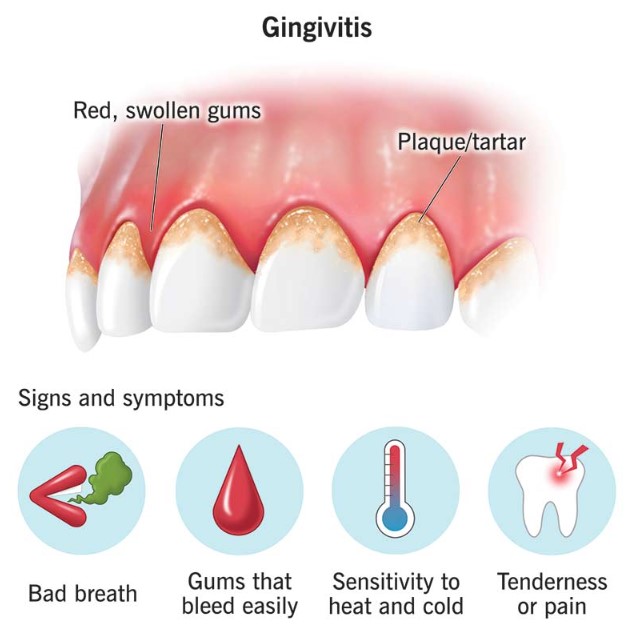In this article:
- Your overall health is related to your mouth health. Healthy Mouth Healthy Body!
- Cause of gum disease and how it relates to chronic diseases
- Warning signs of gum disease
Your mouth is a window into the health of your body
Did you know that your oral health is tied to your overall health? For example, periodontal disease, also known as gum disease, is more common in people with chronic diseases like some forms of heart disease or diabetes than in people without these diseases. This article explains the connection between your mouth health and your overall health.
What you should know about gum disease
Gum disease is an infection and inflammation that affects the tissues and bone that support your teeth. Plaque is a sticky film of bacteria that is always on your teeth. If you do not remove them with regular daily hygiene, it can make your gums red, puffy and swollen. When plaque is on your gum and teeth, it can harden. Tartar is the name of hardened plaque . Tartar on your teeth makes it difficult for you to keep your teeth and gums clean on your own.
As gum disease gets worse, the tissue and bones that support your teeth can become damaged. Over time, your teeth may need to be removed. Gum disease happens often in adults, and if it’s not treated it can lead to tooth loss.
Gingivitis
Gingivitis is an early stage of gum disease. The bacteria in plaque make your gums red, tender and swollen. Your gums might also bleed at this stage. If left untreated, gingivitis can lead to more advanced stages of gum disease.
But the good news is, gum disease at this stage is usually reversible. If it is caught early enough (when it is gingivitis), you may simply need a professional cleaning an dto keep up with daily hygiene: brushing and cleaning between your teeth. Your dental team can also give you advice for improving your daily oral hygiene.

Periodontitis
If gingivitis is not treated, it can turn into periodontitis. As plaque and tartar build up where your teeth and gums meet, the gum tissues and bone around your teeth begin to break down. Periodontitis is usually not painful, but it can lead to bone loss and, in more severe cases, teeth may need to be removed.
The connection between Healthy Mouth Healthy Body
Disease that lower your body’s ability to fight infections may raise your risk of gum disease. And, sometimes having gum disease is shown to raise the severity of chronic disease. While it may not be clear whether one drives the other, some of the chronic diseases that commonly occur at the same time as gum disease are:
- rheumatoid arthritis
- diabetes
- some forms of heart disease
- high blood pressure
- osteoporosis
- stroke
Tell your dentist about any chronic diseases or changes in your over health.
Many of the medications used to treat other disease can affect your mouth by causing dry mouth. These include medication used to treat blood pressure, allergies and pain. Dry mouth can make it difficult for your saliva to help keep your mouth clean, increasing the risk of oral health problems like tooth decay and gum disease.
Make sure your dentist knows about all the medications you are taking.
Using tobacco raises your risk of gum disease
Using tobacco products of any kind, like cigarettes, dip, chew and hookah can increase your risk of gum disease. The disease can also get worse the longer you use tobacco.
Preventing gum disease
In general, it costs much less to keep your teeth and gums healthy than to treat a problem once it happens. These health habits can help:
- Brush your teeth twice a day for two minutes each time using a fluoride toothpaste
- Clean between your teeth every day using a between the teeth cleaner like dental floss, floss holders, water flossers, special picks or narrow brushes that reach between teeth.
- Use a germ fighting mouth rinse or other products if your dentist or hygienist recommends them.
- Eat a healthy diet and limit snacking on sugary or sticky foods between meals.
- Visit your dentist regularly and keep him or her informed about your overall health.
Warning signs of gum disease
- gums that bleed when you brush or floss
- gums that are red, swollen, puffy or tender
- gums that no longer tightly hug your teeth
- bad breath or bad taste in your mouth that doesn’t go away
- increasing spaces between your teeth
- feeling that your teeth are loose
- a change in the way your teeth fit together when you bite
- a change in the way your partial dentures fit
You may notice one ore some of these warning signs, or you may not have any signs of gum disease at all.
This is why it’s important to see your dentist regularly-treatment of gum disease is most successfully when it’s caught early. Do you want to know more about Healthy Mouth Healthy Body?
Rapha Dental is located in Riverton, South Jersey. Call us today at 856-829-8668 to schedule an appointment or contact us.
Copyright @ American Dental Association

